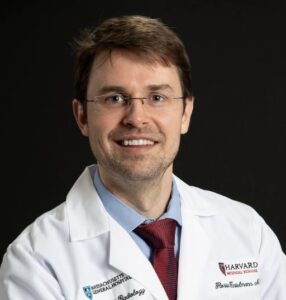In radiology, the new so often begets the novel. For imaging lung cancer, specifically, as innovative therapeutic options become more readily available, updated quantitative biomarkers are required to better buttress treatment selection, patient surveillance, and pharmaceutical development.
To be fair, Florian J. Fintelmann, MD, was already hard at work developing and validating imaging’s next generation of lung cancer biomarkers before becoming the 2019 ARRS Scholar. He just needed more time. Time to hone his understanding of critical oncological concepts in cohorts receiving mutation-specific therapies or immunotherapy. Time to investigate the relationship between CT body composition metrics, frailty, and cardiopulmonary function, while establishing reference values to support sarcopenia diagnosis. Time to define a leading role for chest CT beyond lesion detection, tumor staging, and surgical planning to patient-level prognostication.
Armed with a two-year, $90,000 grant from The Roentgen Fund®, as the assistant professor of radiology at Harvard Medical School and Massachusetts General Hospital staff radiologist explains, he got exactly what he wanted when he needed it the most.

InPractice: How has receiving The Roentgen Fund’s ARRS Scholarship informed your current research?
Florian J. Fintelmann, MD: My work as an ARRS Scholar has allowed me to dive deep into methodological questions, taking the time required to lay a solid foundation for many of the questions my Thoracic Imaging Percutaneous Thermal Ablation Team at Massachusetts General Hospital is addressing these days. The time afforded by this scholarship has allowed me to build up a multidisciplinary team, as well as apply for additional grant funding. The initial project that formed the basis for my ARRS Scholarship, “Advancing Lung Cancer Care With Imaging Biomarkers,” has morphed into multiple other projects. In addition, the Roentgen Fund’s provisioning of resources has since allowed me to develop a wide portfolio with three successful lines of research.
IP: And how has becoming an ARRS Scholar supported you, personally?
FJF: The Roentgen Fund’s support was instrumental in two distinct ways. Firstly, it enabled me to take classes at the Harvard School of Public Health. They have a wonderful summer course on clinical effectiveness, which allowed me to brush up on a lot of skills, learn several new ones, and connect with a very motivated community of budding researchers. Again, the other big aspect was protected time. Starting in 2019, I opted for the two-year model, meaning I had 50% of my time devoted to research during the duration of the scholarship. Of course, this ran right into the COVID-19 pandemic. So, while the world was being turned upside down, after initial trials and errors, I was able to claw back some of that protected time. Being an ARRS Scholar was a truly wonderful experience that allowed me to make significant inroads in terms of my own expertise and the team-building I do now with colleagues.
IP: Any advice for emerging researchers interested in applying for a Roentgen Fund fellowship?
FJF: My advice is simple: apply early. And if you’re not successful, apply again. In fact, I received my ARRS Scholarship on a second attempt. If you are at all interested in applying for any of the six Roentgen Fun scholarship programs, I strongly encourage you to do so because receiving one is a life-changing opportunity. It can take some practice, though. No one knows how to apply for a research or career award just by virtue of being a radiologist. Applying, and especially winning, are additional skills that you will need to learn to be successful. From writing up a plan to connecting with the right people, don’t be afraid to ask for help either.
IP: To whom did you look for help with your application, Dr. Fintelmann?
FJF: Particularly, I would like to shout out Dr. Anthony Samier, who was instrumental in helping me with the ARRS Scholarship application. Of course, my chair, Dr. Jim Brink, my division chief, Dr. Jo-Anne Shepard—the list goes on and on. There are a number of people who have made themselves available to help me move this forward. I appreciate everyone who supported me along the journey, and I want to say thank you to all those who believed I could do it.
IP: Since 1992, some 50 radiologists have been named ARRS Scholars. What’s it like knowing you, too, are on this list?
FJF: Becoming part of this legacy has been a critically important aspect of my research career. Looking back at so many prior scholars, and the community that’s been shaped by this shared experience, is really quite humbling. There are incredibly accomplished people on that list, some of whom I’ve had the pleasure of meeting or working with. Also, I think about those ARRS Scholars who will come after me. We’re all one big, happy family!